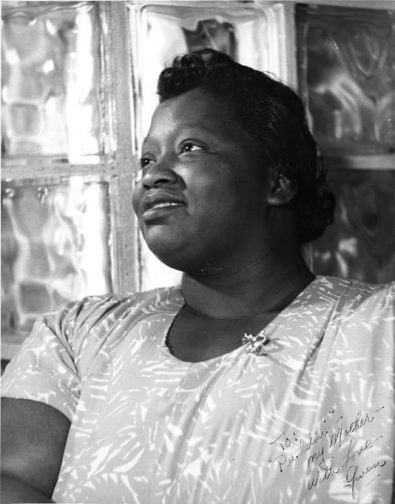Gwen Reed was an actress and educational advocate who grew up in Hartford in the early 20th century. The daughter of a migrant farm worker, Reed lived in the city’s North End while working alongside her mother in the tobacco fields that surrounded the area. She developed an affinity for theater, performing in and directing numerous theatrical productions around Hartford throughout her life, and even became the face of one of the most widely recognized corporate brands in American history. She capitalized on her fame and love of education by dedicating much of her time to improving the lives of Hartford’s children.
Life as a Tobacco Worker
Gwen Reed was born Gwendolyn B. Clarke in Harlem, New York, in 1912. While Gwen was still a young child, her parents separated and Gwen’s mother Georgianna took her daughter and settled in Hartford where she began working in the area’s sprawling tobacco fields. Gwen soon joined her mother in the fields, and the two traveled from farm to farm picking crops wherever they found work.
With little time for formal education, Gwen received lessons in math and spelling from her mother while they worked. Georgianna’s abilities as an educator not only enriched the lives of numerous area adults who learned to read and write under her tutelage but also allowed Gwen to eventually graduate from Hartford Public High School. After a brief period of studying law at Hartford Federal College, she married John T. Reed in 1935.
Reed Takes on a New Role with Hartford’s Charles Gilpin Players
The following year, Gwen went to work as a secretary for the Charles Gilpin Players who performed as part of the Connecticut Federal Theatre Project’s “Negro Unit.” In 1937, Reed accepted a small role in the Gilpin Players’ production of Trilogy in Black. This was the first of many roles to follow, as Reed later acted in such productions as The World We Live In, Mississippi Rainbow, and The Emperor Jones. While she continued to work in the tobacco fields during this period, she soon became a fixture of community theaters in Hartford, Glastonbury, and Farmington.
The role that brought Reed before the largest audiences—and afforded her a degree of financial security—was that of Aunt Jemima, the fictional spokesperson for Quaker Oats Company products and one of the most enduring incarnations of the mammy stereotype in American culture. From 1946 until 1964, Reed traveled promoting the brand at pancake festivals, grocery stores, state fairs, and school assemblies. In the many newspaper clippings of her appearances, Reed’s real name is never given.
A Champion of Childhood Literacy
When not acting or harvesting tobacco, Reed dedicated her time to educational and community work. She regularly appeared in the Children’s Corner of the Hartford Public Library to read stories aloud to area children—a role she eventually turned into a local television segment on Channel 3 entitled, “Story Time with Gwen Reed.” Additionally, Reed became an active member of the Head Start and Reading is Fundamental programs, while also starting the Playtime for Tots program to help preschool children at the Bellevue Square housing complex in Hartford (where Reed lived) learn letters and numbers.
Reed continued to pursue her love of acting, however, and in 1951 became the director of the Hartford Community Players. For the next 16 years, the acting troupe put on numerous productions, including A Raisin in the Sun, Rain, and Purlie Victorious (for which Reed won the Herald Award for best supporting actress). Reed left the Hartford Community Players in 1967, at the age of 59. She passed away 7 years later.
Following Reed’s death, Hartford mayor George Athanson dedicated a story room at the Hartford Public Library in her honor. Additionally, the library acquired a collection of Reed’s letters, playbills, and scrapbooks to add to their Hartford History Center archives. Today, a star in the cement on the library’s patio continues to honor her memory and contributions to Hartford’s history.









